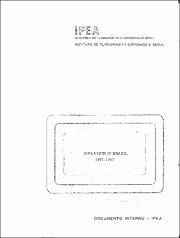Please use this identifier to cite or link to this item:
https://repositorio.ipea.gov.br/handle/11058/13829Files in This Item:
| File | Description | Size | Format | |
|---|---|---|---|---|
| Inflation_in_Brazil.pdf | 9.57 MB | Adobe PDF |  View/Open |
| Title: | Inflation in Brazil : 1947-1967 |
| Authors: | Zottmann, Luiz |
| Abstract: | This study examines the nature of Brazilian inflation from 1947 to 1967, addressing key questions about the causes of price increases: 1) shortages in food and foreign exchange supply, 2) wage adjustments exceeding productivity gains and other non-wage related causes, and 3) excessive monetary expansion. The study measures these causes as imbalances between demand and supply in various markets. The model distinguishes itself by testing the relative inflationary impact of structural and monetary factors and allowing for partial absorption of cost-push inflation through GDP growth. Despite data limitations, the study finds that import, wage, and monetary imbalances were significant explanatory variables, though their impact varied over time. Wage imbalances were the main source of inflation from 1952 to 1959. Import imbalances never caused price increases above 5% annually. Monetary disturbances were the primary inflation source from 1947 to 1951 and from 1960 onward. The study’s findings align with observed trends in employment and investment. |
| metadata.dc.rights.holder: | Instituto de Pesquisa Econômica Aplicada (Ipea) |
| metadata.dc.rights.license: | É permitida a reprodução deste texto e dos dados nele contidos, desde que citada a fonte. Reproduções para fins comerciais são proibidas. |
| metadata.dc.type: | Tese |
| Appears in Collections: | Economia. Desenvolvimento Econômico: Teses e Dissertações |
Items in DSpace are protected by copyright, with all rights reserved, unless otherwise indicated.

